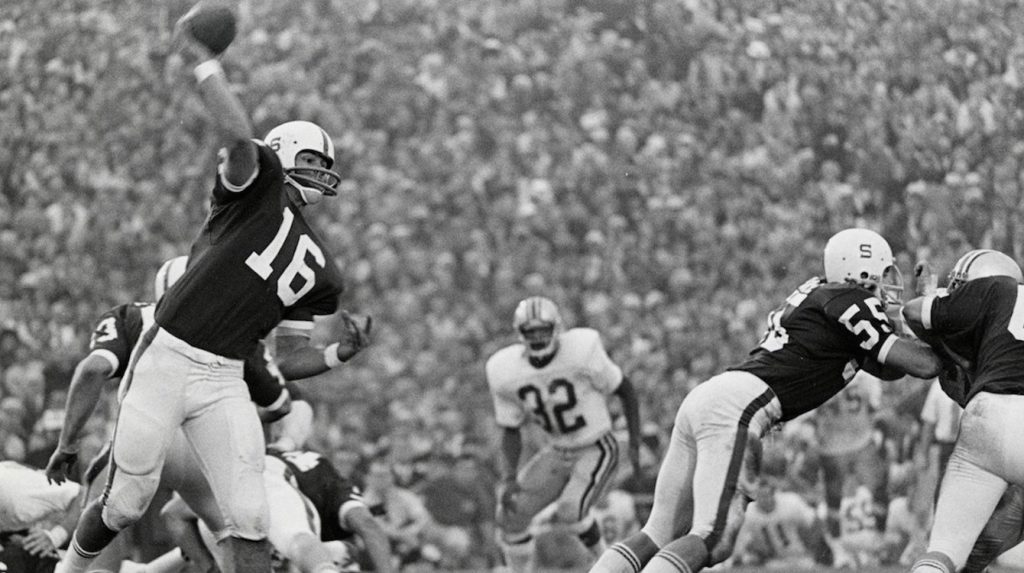
This Week in Heisman History: Jim Plunkett leads Stanford over undefeated USC

To say that the Stanford football team of 1970 had some demons to exorcise vis-a-vis the USC Trojans is an understatement.
Not only had Stanford been winless against Troy since 1957, the 1968 and 1969 losses were of the gut-wrenching variety, with top-5-ranked USC edging the Cardinal each time thanks to the leg of Trojan kicker Ron Ayala.
Stanford quarterback Jim Plunkett was the quarterback for each of those losses. He wasn’t going to let it happen a third time.
This week in Heisman history, Plunkett led No. 12 Stanford to a victory over No. 4 USC, snapping the Cardinal’s losing string to the Trojans while also putting an end to Troy’s 25-game regular-season unbeaten streak.
Stanford came into the contest at 4-1, fresh off a loss the previous week to Purdue. Through five games, Plunkett had 1,014 passing yards and seven touchdowns but was considered a longshot to win the Heisman Trophy. Beating USC would change that.
The Trojans came to Palo Alto at 3-0-1, with the only blemish a 21-21 tie versus Nebraska. USC’s last regular season loss was a 3-0 decision at Oregon State back in 1967.
To say Stanford was looking forward to the USC game was an understatement (and may have contributed to the Purdue loss the week before). Stanford coach John Ralston held out five injured players against the Boilermakers to assure they’d be ready for the Trojans.
“We weren’t exactly overlooking Purdue,” Plunkett later told Sports Illustrated, “but we planned to play through them and peak for USC. Preparing for the Trojans, we only suited up once all week. We had done our physical training the previous week.”
The game was a sellout, with over 90,000 in attendance, and the atmosphere even more charged thanks to a bomb threat to Stanford Stadium courtesy of local terror outfit The Weathermen.
Plunkett was hot from the jump, completing a 50-yard touchdown pass to tight end Bob Moore on the Cardinal’s third possession as Stanford took a 14-0 halftime lead into the lockerroom. USC bounced back in the third quarter to make it 14-7, but Plunkett completed four consecutive passes, including a 34-yarder to Randy Vataha and soon it was 21-7, Stanford.
USC again scored to make it 21-14, but a late field goal sealed the game for Stanford. The 24-14 victory put the Cardinal in the driver’s seat for a Rose Bowl berth.
Plunkett finished the game with 19 completions in 31 attempts for 275 yards with one TD and one interception.
Stanford went on to an 8-3 record, while Plunkett threw for a Pac-8 record 2,715 yards and 19 touchdown passes. After beating out Joe Theismann and Archie Manning for the Heisman (in what was dubbed “The Year of the Quarterback”), Plunkett led Stanford to an upset of Ohio State in the Rose Bowl, giving the Cardinal their first Rose Bowl victory since 1941 and spoiling the Buckeyes’ national title hopes.
In three seasons with Stanford, Plunkett’s total offensive records included most pass attempts (962); most pass completions (530); most net yards passing (7,544); most touchdown passes (52); most plays total offense (1,174); and most yards total offense (7,887). His net yards passing and most yards total offense were NCAA records at the time.
He was selected by the New England Patriots as the number one overall draft choice in 1971. He was traded in 1976 to the 49ers, and in 1980, joined the Oakland Raiders and quarterbacked them to two Super Bowl wins in 1980 and 1983, and was named the MVP of the 1980 match-up.
He was elected to the National Football Foundation and College Hall of Fame in 1990.




